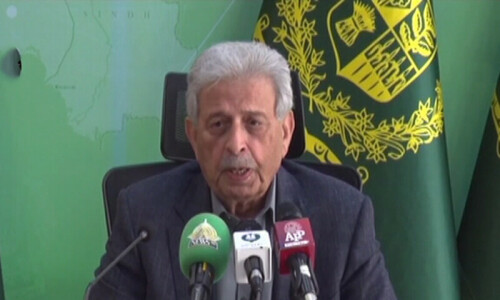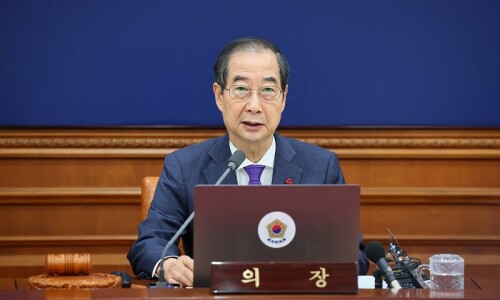ISLAMABAD: As the government came under fire in the Senate for presenting what the opposition called an unrealistic budget, a federal minister said that corruption and incompetence of the Federal Board of Revenue (FBR) was causing around Rs1 trillion revenue loss to the exchequer.
Minister for Narcotics Control Senator Azam Swati in a tirade against the FBR termed it the most corrupt institution in the country.
Mr Swati said he used same words in a recent cabinet meeting.
He revealed that the prime minister endorsed his stance and said “yes it is 100 per cent corrupt and said that is why we are going for automation”, alleging that a majority of those in the FBR were extremely corrupt and even an FBR inspector was making big bucks.
The minister said that expansion in the tax base was the key to taking the people and the country forward.
Opposition calls budget unrealistic
Jamaat-i-Islami Senator Mushtaq Ahmad said that no senior officer of the FBR was present in galleries during such an important debate on budget.
At this, Senate Chairman Sadiq Sanjrani ruled that the FBR chairperson, member (policy), member (customs) and member (income tax) must be present before commencement of the Senate session on Wednesday at 4pm.
Earlier, opening the discussion on the budget in the house, PPP parliamentary leader in the Senate Sherry Rehman said that the proposed budget appeared to have been made on another planet as it was devoid of any reality.
She said that it was a cut and paste of the last year’s budget just to get the accounting exercise done to appease the IMF.
“It is a cruel and unusual budget as it completely ignores the crisis that is hitting the country. It is time to heal polarities and to make difficult and structural decisions as the country is adrift in a time of acute emergency without a roadmap, and we have been given the message that we are on our own.
“The country is going through a crisis, a national emergency. Yet we have not received a crisis budget. The budget appears to assume that the Covid-19 threat does not exist and it lacks any roadmap for economic recovery. Other than paper-statements, both the opportunity and the challenge presented by Covid-19 have not been reflected in the budget,” she said.
“All we hear are justifications of what was inherited. The budget has been presented at a time when we are going through a pandemic but the federal government has used Covid-19 as a mask to hide its failures. We should not underestimate the impact of Covid-19 on the country’s fragile economy and we must not lose sight of the fact that our economy was suffering before the onset of Covid-19 also,” she added.
She said the government had given a brutal and savage message to the people of the country by adopting a hands-off approach to saving lives, which was the cruel policy of herd culling.
“Is this not a policy of the survival of the fittest? We are living in a Nazi-Niazi country with a Niazi economy. What does this budget have for the common people? Where is the livelihood which the government keeps bringing up? she asked.
PPP Senator Mian Raza Rabbani, while taking part in the debate, said the budget had nothing for the common man.
“It is not the real budget, the actual budget has been made and kept with the International Monetary Fund (IMF),” he said while criticising Pakistan Tehreek-i-Insaf (PTI) government’s proposed Finance Bill 2020.
The PPP lawmaker underscored that the budget did not provide any relief in price hike, unemployment, shortage of drugs as well as petroleum products and rising price of sugar and wheat.
He alleged that the vagueness and non-seriousness of the budget were reflected in the press conference of Adviser to the PM on Finance Dr Abdul Hafeez Shaikh when he said “that the provinces should formulate their budgets based on their own best assessments and the past performance of the Federal Board of Revenue (FBR). He further shows his distrust in institutions functioning under him when he says the FBR has seldom achieved tax targets given to it”.
PML-N Senator retired Abdul Qayyum said the size of the economy had shrunk from $315 billion to $264bn, the GDP growth had taken an unprecedented nose dive from 5.8 per cent to 1.9pc last year and the World Bank expected it would further go down to -.4pc this year, the first time since 1952.
“The revenue collection has seen a shortfall of about Rs1 trillion. Inflation has gone up from 4pc to as high as 24pc and is still in double figures, although it is being reported as 8.5pc. The per capita income has gone down from over 1,600 dollars to about 1,200 dollars, while population-wise a six times bigger India has over 2,300 dollars per capita income. More than 1.5 million people have lost their jobs in the last one year before Covid-19, while the government promised to create 10 million jobs,” the PML-N leader said.
Published in Dawn, June 16th, 2020















































